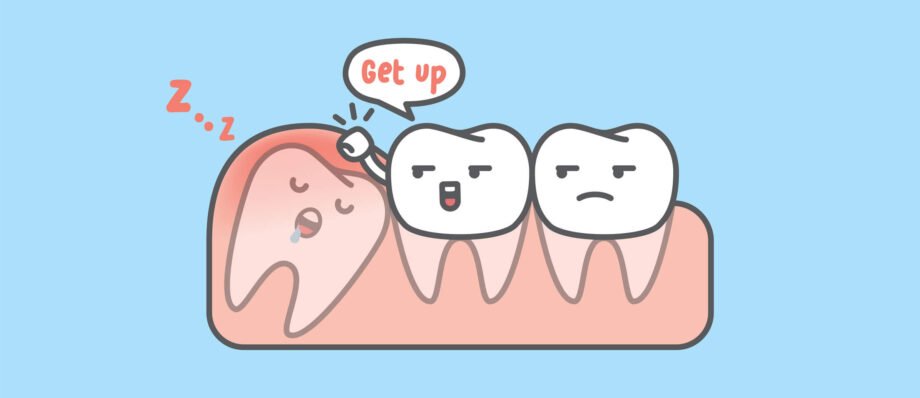Impacted teeth are a common dental condition that can cause discomfort and potential complications if left untreated. When a tooth fails to emerge fully through the gums or emerges at an abnormal angle, it is considered impacted. This condition most frequently affects wisdom teeth, but it can also occur with other permanent teeth, such as canines or premolars. In this comprehensive guide, we will explore the causes, symptoms, and treatment options for impacted teeth.
Table of Contents
ToggleCauses of Impacted Teeth
Several factors can contribute to the development of impacted teeth:
- Insufficient Space
- Abnormal Growth
- Overcrowding
- Genetics
- Late Eruption
Insufficient Space
One of the primary reasons for tooth impaction is a lack of space in the jaw. If there is not enough room for a tooth to erupt properly, it may become trapped beneath the gum line.
Abnormal Growth
Sometimes, teeth may develop at an angle or in an abnormal position, making it difficult for them to erupt normally.
Overcrowding
Crowded teeth can create obstacles for proper tooth eruption, increasing the likelihood of impaction.
Genetics
Genetics play a significant role in the development of teeth. If a person inherits a small jaw or other dental anomalies, they may be more prone to impacted teeth.
Late Eruption
Wisdom teeth, also known as third molars, typically erupt between the ages of 17 and 25. However, if they erupt late, there may not be enough space left in the jaw, leading to impaction.
Symptoms of Impacted Teeth
The symptoms of impacted teeth can vary depending on the severity and location of the impaction. Common signs and symptoms include:
- Pain and Discomfort
- Swelling
- Difficulty Opening Mouth
- Bad Breath
- Jaw Stiffness
- Headaches
Pain and Discomfort
Impacted teeth often cause pain, especially when chewing or biting down. The pain may be intermittent or constant and can radiate to the surrounding areas of the jaw and face.
Swelling
Swelling and tenderness in the gums around the impacted tooth are common symptoms. In some cases, swelling may be severe enough to cause difficulty in opening the mouth.
Difficulty Opening Mouth
Tooth impaction can make it challenging to open the mouth fully due to pain and swelling.
Bad Breath
Bacteria and food particles can become trapped around the impacted tooth, leading to bad breath or an unpleasant taste in the mouth.
Jaw Stiffness
Stiffness or limited mobility of the jaw can occur, especially if the impacted tooth is pressing against adjacent teeth or nerves.
Headaches
Some individuals may experience headaches or migraines as a result of the pressure and tension caused by tooth impaction.
Treatment Options for Impacted Teeth
The treatment for impacted teeth depends on various factors, including the severity of the impaction, the position of the tooth, and the individual’s overall dental health. Here are some common treatment options:
- Monitoring
- Extraction
- Orthodontic Treatment
- Exposure and Bonding
- Apicoectomy
- Antibiotics
Monitoring
In some cases, impacted teeth may not cause any symptoms or complications. In such instances, the dentist may choose to monitor the tooth periodically to assess any changes or potential problems.
Extraction
Extraction is the most common treatment for impacted wisdom teeth. If the impacted tooth is causing pain, infection, or damage to surrounding teeth, the dentist may recommend surgical extraction.
Orthodontic Treatment
Orthodontic interventions, such as braces or aligners, may be used to create space in the jaw and guide the eruption of impacted teeth into their proper position.
Exposure and Bonding
For impacted teeth that are close to the surface of the gum, a surgical procedure called exposure and bonding may be performed. During this procedure, the dentist exposes the impacted tooth and bonds an orthodontic bracket to it, allowing it to be guided into position with braces.
Apicoectomy
In cases where an impacted tooth is causing damage to the surrounding bone or structures, a surgical procedure known as an apicoectomy may be necessary to remove the tip of the tooth’s root.
Antibiotics
If an impacted tooth becomes infected, antibiotics may be prescribed to reduce inflammation and prevent the spread of infection.
Prevention of Impacted Teeth
While it may not always be possible to prevent impacted teeth, there are steps individuals can take to reduce their risk:
- Regular Dental Check-ups
- Orthodontic Evaluation
- Wisdom Teeth Evaluation
- Good Oral Hygiene
Regular Dental Check-ups
Routine dental visits allow dentists to monitor the development of teeth and identify potential issues early on.
Orthodontic Evaluation
An orthodontic evaluation can help identify crowding or alignment issues that may increase the risk of impacted teeth. Early intervention with braces or other orthodontic treatments can help create space for proper tooth eruption.
Wisdom Teeth Evaluation
Around the age of 16, individuals should undergo a thorough evaluation of their wisdom teeth to assess their position and determine whether they are likely to become impacted.
Good Oral Hygiene
Maintaining good oral hygiene habits, such as brushing and flossing regularly, can help prevent gum disease and reduce the risk of infection around impacted teeth.
Conclusion
Impacted teeth can be a source of discomfort and potential complications if not addressed promptly. Understanding the causes, symptoms, and treatment options for tooth impaction is essential for maintaining oral health and preventing future problems. Regular dental check-ups and early intervention can help identify and manage impacted teeth before they cause significant issues. If you suspect you have an impacted tooth or are experiencing symptoms such as pain, swelling, or difficulty opening your mouth, it is essential to consult with a dentist for an evaluation and appropriate treatment. By taking proactive steps to address tooth impaction, individuals can maintain healthy smiles and overall well-being.


zoritoler imol
14 June 2024It’s hard to search out knowledgeable people on this subject, however you sound like you realize what you’re speaking about! Thanks